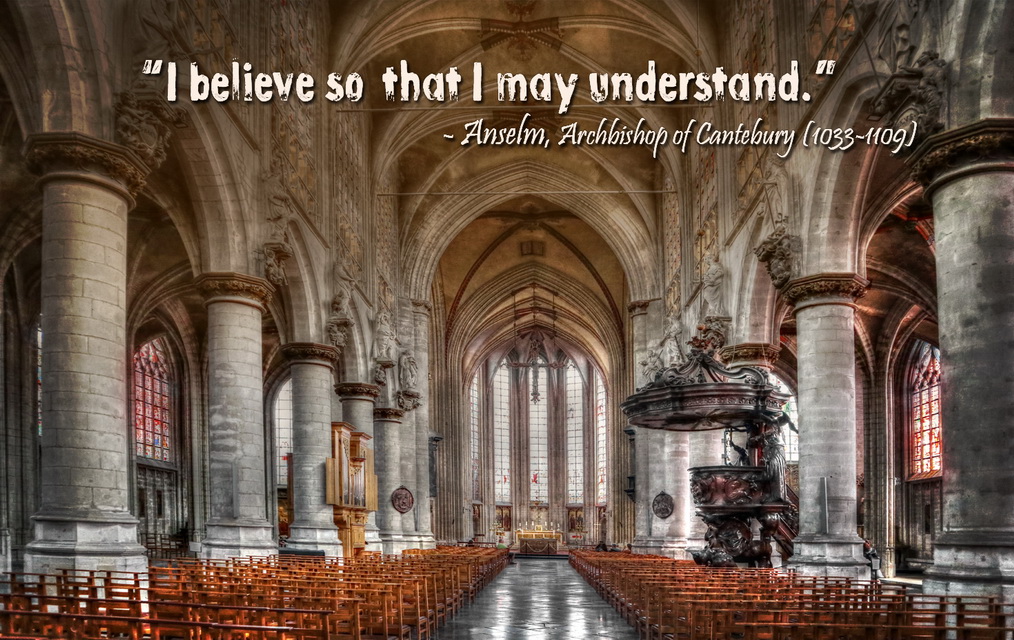“CREDO UT INTELLIGAM” – FAITH VS INTELLECTUAL REASON
In philosophy, there is often discussion concerning the differences between faith and intellectual reason, and some writers have produced a form of rationalism that brings an indictment on Christianity and believers in Christ. The words of the philosopher Rene Descartes penned in 1637, “Cogito Ergo Sum,” (“I think, therefore I am,”), started the foundation and basis of human rationalization. Descartes in writing this proposition, effectively became the predecessor to philosophical humanism. His “Cogito Ergo Sum” statement essentially declares that the filter of one’s own reason, rationale, and understanding, becomes the basis of interpreting all human experience.
Faith in contrast asserts that one must cling to belief in God even when rationality cannot be confirmed. When praying and trying to make sense of the complexities and details of life, faith survives, and will emerge strong. This is part of what Peter called, “the trial of your faith, which is more precious than gold.” (1 Peter 1:7)
When you and I as believers in Christ are perplexed with trials and difficulties, we’re often faced with a dilemma, “Do I let my emotions, logic, and intellect, dictate my position of faith,” or … “Do I trust God, when all coherent reason and understanding seem absent? Do I continue in faith when questions and doubts are strong?” This trial of faith is one that all believers in Christ must pass through. Christ taught us that ” … men ought always to pray and not give up.” (Luke 18:1 – NIV). We do best when we turn our doubts into prayers.
Anselm, Archbishop of Cantebury (1033-1109) offered the powerful antidote to living by rationalization and intellectual reasoning alone. His words and prayer “Credo Ut Intelligam,” have made profound impact upon the lives of believers for centuries, and upon my life as well. In his writing, Anselm echoed the teaching of Augustine (254-430AD) with underpinnings and understanding concerning God’s sovereignty. “Credo Ut Intelligam,” translated from Latin is interpreted, “I believe so that I may understand.”
Rationalism suggests, I must see and be convinced intellectually and rationally, to understand God, but faith declares that believing first is that which gives way to understanding. Anselm’s statement in simplicity, boldly declared – “I believe, so that understanding may come.” – Which is to say that – Faith will give way to clear understanding. In the midst of great doubt, Anselm’s conclusion became more bold, as he emphatically declared, “Unless I believe (first), I will not (be able to) understand.”
In times of doubt, believers in Christ must rest upon the bedrock of truth – that God does all things well, and that Romans 8:28, holds unequivocally true. – “All things work together for good to those who love God, to those who are called according to His purpose.” (Rom. 8:28)
In the midst of doubt, faith exists and triumphs.
The Prayer of Anselm
“Lord Jesus Christ, Let me seek you by desiring you, and let me desire you by seeking you; let me find you by loving you, and love you in finding you. I confess, Lord, with thanksgiving that you have made me in your image, so that I can remember you, think of you, and love you. But that image is so worn and blotted out by faults, and darkened by the smoke of sin, that I cannot do that for which it was made unless you renew and refashion it.
Lord, I am not trying to make my way to your height, for my understanding is in no way equal to that, but I do desire to understand a little of your truth which my heart already believes and loves. I do not seek to understand so that I can believe, but I believe so that I may understand; and what is more, I believe that unless I do believe, I shall not understand.”










